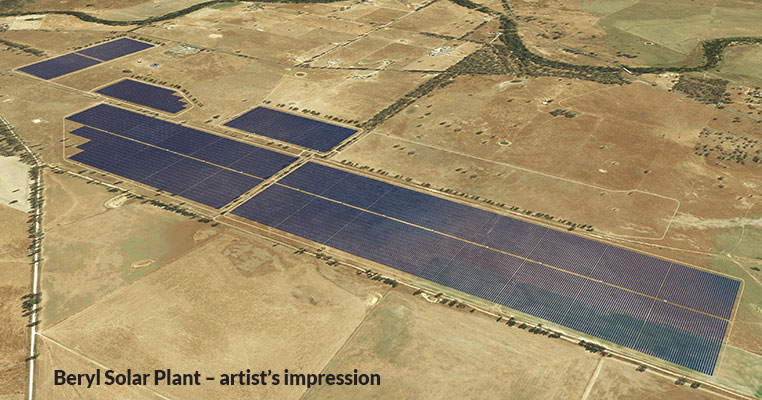As demand for clean energy continues to surge among Australian businesses, Kellogg’s Australia has committed to sourcing the equivalent of 100% of its electricity needs for its manufacturing operations in New South Wales from the 110 MW Beryl Solar Farm. Based on 2018 production data, the power purchase agreement (PPA) would offset the amount of energy needed to produce an estimated 630 million boxes of Australian-made cereals for the duration of the seven-and-a-half year deal.
Kellogg’s has an option to extend the PPA term for three years until the end of 2029. The volume of electricity and Large-Scale Generation Certificates (LGCs) sold to the cereal manufacturer will account for 29% of the farm’s generation for the remainder of 2019, with this proportion decreasing over the life of the PPA. Kellogg’s will retrospectively acquire all of the electricity and LGCs produced from the date the plant began generation. “By selling electricity and LGCs to Kellogg’s rather than into spot markets, Beryl reduces its exposure to fluctuating electricity and LGC prices,” solar farm investor New Energy Solar (NEW) said in a statement to ASX.
With the Kellogg’s PPA in place, NEW expects Beryl’s five-year unlevered annual average gross yield to be 8.2%. “This agreement complements Beryl’s existing PPA and contributes to the achievement of our strategy to build a portfolio of stable, long-term, contracted cashflows from investment-grade counter-parties. In addition, the Kellogg’s PPA further diversifies the range of offtakers and contract lengths in the portfolio, enhancing NEW’s ability to deliver attractive, risk-adjusted returns to investors,” John Martin, CEO of NEW, said.
Switched on last month, the 87 MW Beryl Solar Farm is already providing part of its output to the Sydney Metro Northwest railway based on a 15-year PPA, which account for around 69% of its generation. The project was acquired by New Energy Solar from First Solar last year. Downer Group acted as EPC on the project and began construction last May.
While originally announced the project will use First Solar’s large-format Series 6 modules, a change in module supplier was announced in February. New Energy Solar said it had made a switch to Longi modules, which were installed together with Ingeteam inverters and Exosun tracking technology.
“The use of LONGi modules has allowed for a redesign that will increase the number of modules and thereby increase project installed capacity by 2.5 MWdc from 108.4 MWDcto 110.9 MWdc, with a resulting increase in expected annual generation and annual cash yields,” the investor said at the time.
The Beryl Solar Farm is one of the two PV projects in New Energy Solar’s Australian portfolio. The 55.9 MW Manildra project in New South Wales is another project acquired from First Solar. It has been operating since April last year and sells power and LGCs to EnergyAustralia under a 10-year PPA with an option to extend out to 2030.
For Kellogg’s, a global cereal company with net sales of over US$13bn in 2018 and a member of the RE100 initiative to transition to sourcing 100% of its global electricity needs from renewable sources, the deal is a major step in delivering its broader sustainability commitments.
“Our partnership with Beryl enables us to champion and support the clean energy revolution, helping to offset the greenhouse gas emissions from both our head office and manufacturing site in Australia as part of our broader sustainability commitments,” Esme Borgelt, Managing Director of Kellogg’s Australia and New Zealand. “It’s through innovative partnerships like this, along with our ongoing focus on reducing energy demands within our value chain, that companies like Kellogg’s can help reduce their impact on the environment.”
A number of food and beverage companies have already taken similar solar commitments, including winemakers Pernod Ricard Winemakers and Australian Vintage, brewer Cartlon United Breweries, major snack food manufacturer Snack Brands and confectionary giant Mars Australia.
This content is protected by copyright and may not be reused. If you want to cooperate with us and would like to reuse some of our content, please contact: editors@pv-magazine.com.









By submitting this form you agree to pv magazine using your data for the purposes of publishing your comment.
Your personal data will only be disclosed or otherwise transmitted to third parties for the purposes of spam filtering or if this is necessary for technical maintenance of the website. Any other transfer to third parties will not take place unless this is justified on the basis of applicable data protection regulations or if pv magazine is legally obliged to do so.
You may revoke this consent at any time with effect for the future, in which case your personal data will be deleted immediately. Otherwise, your data will be deleted if pv magazine has processed your request or the purpose of data storage is fulfilled.
Further information on data privacy can be found in our Data Protection Policy.